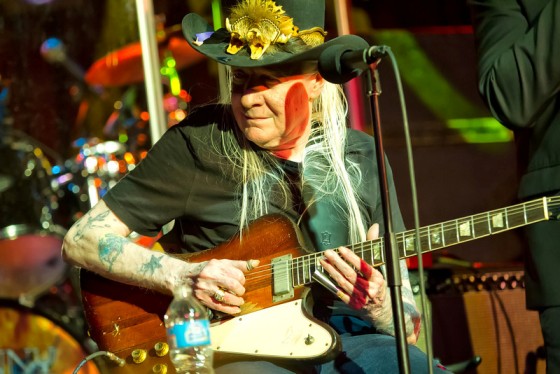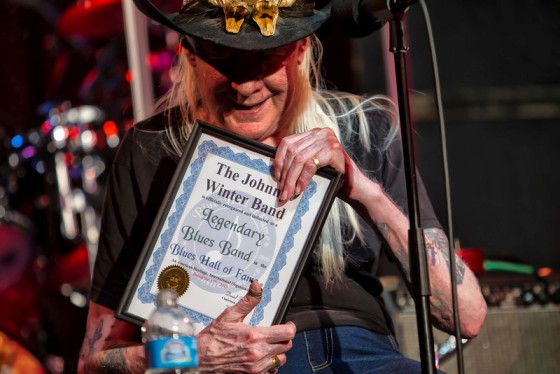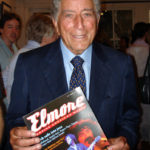Some artists can grab the audience’s attention before they even hit the first note. When Johnny Winter took the stage, one look at his white mane and elaborate dragon tattoo let everyone know he wasn’t messing around. As flamboyant as Winter’s stage persona was, his music remained the main attraction. One of his concert staples was a turbo-charged rendition of Freddie King’s “Hide Away.” His fingers seemed to fly across the fret board as he churned out King’s signature licks in his own heavy, distorted tone. A highpoint of any Winter gig was the moment he put a slide on his finger and picked up his beloved Gibson Firebird. His searing renditions of “Mojo Boogie” and “Black Cat Bone” left no doubt that he was a bluesman at heart.
When Johnny Winter left us on July 16th, the music world lost an iconic figure. Elmore Magazine’s Executive Director Arnie Goodman, a Winter fan since 1968, recalls seeing him perform for the first time at the Fillmore East. “He blew everyone away,” Goodman reflects. “In the 60’s and 70’s, Winter was one of the most dynamic guitarists in the business.” Goodman also notes that it was Winter who made Texas blues-rock into an essential piece of America’s musical mosaic. “Winter’s success opened the doors for Texas guitarists like ZZ Top’s Billy Gibbons and Stevie Ray Vaughan,” Goodman asserts. “Today Austin, Texas is a music mecca. It was Johnny Winter who first put Austin on the map.”
Any discussion of Winter’s legacy must include his close relationship with blues legend Muddy Waters. The two blues icons first met when they shared the bill at an Austin club. When Winter was later asked by Epic Records to produce Waters’ first recording for the label, he jumped at the chance. “My whole thing was to make the record that Muddy Waters wanted to make,” Winter claimed. “He was the boss. My job as producer was to get things sounding right to him.” Hard Again, released in 1977, was the first of a string of Winter-produced Muddy Waters albums. The success and critical acclaim that followed gave Waters’ career a shot in the arm.
“It was Johnny that bought Muddy Waters’ career back,” muses Arnie Goodman. “He took him out of the small clubs and put him into large arenas in front of rock fans.” Even today, Waters’ and Winter’s recording of “Mannish Boy” stands up as a blues classic, instantly recognizable to even the most casual fan.
Johnny Winter has passed on, but the extensive body of work he leaves behind allows his howling vocals and blistering guitar to live on. Elmore’s Arnie Goodman is fond of the early recordings The Progressive Blues Experiment and Live Johnny Winter And. For this writer, later works like Third Degree and Let Me In are essential listening, along with any volume in the extensive Live Bootleg Series. Winter told biographer Mary Lou Sullivan that he wanted to be remembered “as a great blues player.” Let us grant him this final wish.

Photo Credit: Arnie Goodman

– Jon Kleinman







Be the first to comment!